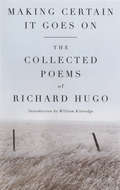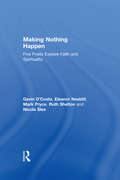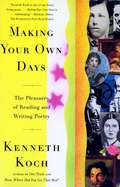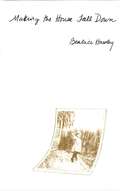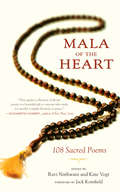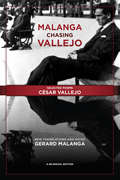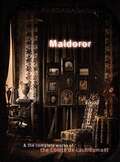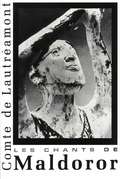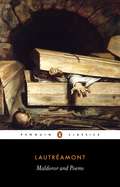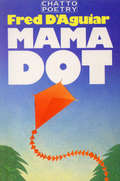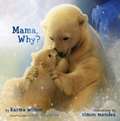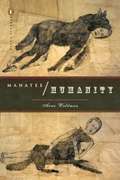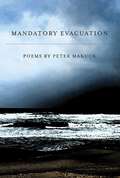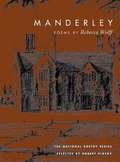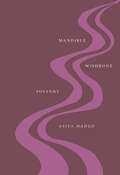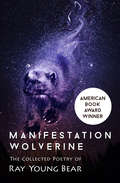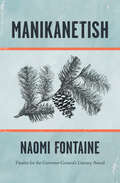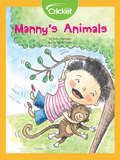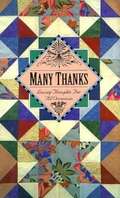- Table View
- List View
Making Certain It Goes On: The Collected Poems of Richard Hugo
by Richard Hugo William KittredgeThe definitive collection of a major American poet's work. Richard Hugo was, in James Wright's words, "a great poet, true to our difficult life." Making Certain It Goes On brings together, as Hugo wished, the poems published in book form during his lifetime, together with the new poems he wrote in his last years.
Making Nothing Happen: Five Poets Explore Faith and Spirituality
by Eleanor Nesbitt Gavin D'Costa Mark Pryce Ruth SheltonMaking Nothing Happen is a conversation between five poet-theologians who are broadly within the Christian tradition - Nicola Slee, Ruth Shelton, Mark Pryce, Eleanor Nesbitt and Gavin D'Costa. Together they form The Diviners - a group which has been meeting together for a number of years for poetry, and theological and literary reflection. Each poet offers an illuminating reflection on how they understand the relation between poetry and faith, rooting their reflections in their own writing, and illustrating discussion with a selection of their own poems. The poets open up issues for deeper exploration and reflection, including: the nature of creativity and the distinction between divine and human creation; the creative process as exploration, epiphany and revelation; the forging of identity through writing; ways in which the arts reflect, challenge and dialogue with faith, and faith can inform and challenge the arts; power and voice in poetry and faith; and ways in which race, gender and culture interact with and shape poetic and theological discourse. This book will be of interest to poets and theologians, to all who read poetry and are interested in the connections between literature and faith, to those seeking inspiration for preaching, liturgy and pastoral care, and to those committed to the practice and nurturing of a contemplative attitude to life in which profound attention and respect are offered to words and to the creative Word at work.
Making Your Own Days: The Pleasures of Reading and Writing Poetry
by Kenneth KochFrom one of the most esteemed American poets of the twenty-first century comes a celebration of poetry and an invitation for anyone to experience its beauty and wonder. Full of fresh and exciting insights, Making Your Own Days illuminates the somewhat mysterious subject of poetry for those who read it and for those who write it--as well as for those who would like to read and write it better. By treating poetry not as a special use of language but as a distinct language--unlike the one used in prose and conversation--Koch clarifies the nature of poetic inspiration, how poems are written and revised, and what happens to the heart and mind while reading a poem. Koch also provides a rich anthology of more than ninety works from poets past and present. Lyric poems, excerpts from long poems and poetic plays, poems in English, and poems in translation from Homer and Sappho to Lorca, Snyder, and Ashbery; each selection is accompanied by an explanatory note designed to complement and clarify the text and to put pleasure back into the experience of poetry.
Making the House Fall Down
by Beatrice Hawley"Hawley's spare, emblematic poetry is like the stones she so often writes about: monumental, enduring, clean and insistently its own shape. Stripped to the bone her poems catalogue the minutiae of moments that, except in poetry, have no form." --Jane Barnes, Dark Horse
Mala of the Heart
by Kate Vogt Ravi NathwaniThis collection of timeless poetry celebrates the eternal spiritual truth within each heart. Since ancient times, this hidden essence has been symbolized by the number 108. There are 108 earthly desires, 108 human feelings, 108 delusions, 108 beads in the traditional meditation mala, and 108 sacred poems in this anthology. Filled with crystalline wisdom from the great poets, sages, saints, and mystics, this selection of poems is a collective expression of universal heart-filled wisdom. The poems span a wide range of cultures and civilizations -- from India to Europe, Japan, and the Middle East -- and each one offers a unique perspective about the path to awakening. Some of the poems express belief in a higher being. Some convey instantaneous awakening. Others lead the reader down a disciplined path of contemplation. Ordered according to a broad interpretation of the heart-centered chakra model, these remarkable poems guide the reader toward realization and offer timeless jewels of insight to spark awakening and enrich spiritual practice.
Malanga Chasing Vallejo
by Gerard MalangaIn the forceful, staggering poetry of César Vallejo, poet and photographer Gerard Malanga discovered a kindred spirit. Driven by a deep sense of spiritual kinship and with the encouragement of Vallejo's widow, Malanga's translations reveal a profound perspective on Vallejo's work that brings into focus the brutal desperation behind his genius. Malanga Chasing Vallejo gathers 82 of Vallejo's poems in a bilingual edition that is marked by the spiritual connection between poet and translator. A work of the heart, these poems are presented from the position of a fellow member of the underclass, providing a street-level entry point for readers who can relate to the hunger feeding every verse and the ache of loneliness that no amount of modern technology can obscure. In addition to the poems, Malanga's heartfelt introduction describes the process of his 45-year commitment to this project. The book also includes a poem about Vallejo by Malanga, rare photos of Vallejo, and transcriptions of several never-before-published letters to Malanga from Vallejo's widow, Georgette de Vallejo, which guided his translation efforts.
Malanga Chasing Vallejo: César Vallejo
by César Vallejo Gerard MalangaIn the forceful, staggering poetry of César Vallejo, poet and photographer Gerard Malanga discovered a kindred spirit. Driven by a deep sense of spiritual kinship and with the encouragement of Vallejo's widow, Malanga's translations reveal a profound perspective on Vallejo's work that brings into focus the brutal desperation behind his genius. Malanga Chasing Vallejo gathers 82 of Vallejo's poems in a bilingual edition that is marked by the spiritual connection between poet and translator. A work of the heart, these poems are presented from the position of a fellow member of the underclass, providing a street-level entry point for readers who can relate to the hunger feeding every verse and the ache of loneliness that no amount of modern technology can obscure. In addition to the poems, Malanga's heartfelt introduction describes the process of his 45-year commitment to this project. The book also includes a poem about Vallejo by Malanga, rare photos of Vallejo, and transcriptions of several never-before-published letters to Malanga from Vallejo's widow, Georgette de Vallejo, which guided his translation efforts.
Maldoror
by Isidore De Lautréamont Alexis LykiardA curious piece of fiction from a little known pseudonymous author with a fluid, non-temporal examination of the baseness of humanity.
Maldoror (Les Chants de Maldoror)
by Guy Wernham Conte De LautreamontThis macabre but beautiful work, Les Chants de Maldoror, has achieved a considerable reputation as one of the earliest and most extraordinary examples of Surrealist writing. Maldoror is a long narrative prose poem which celebrates the principle of Evil in an elaborate style and with a passion akin to religions fanaticism. The French poet-critic Georges Hugnet has written of Lautréamont: "He terrifies, stupefies, strikes dumb. He could look squarely at that which others had merely given a passing glance." When first published in 1868-69, Maldoror went almost unnoticed. But in the 1890s the book was rediscovered and hailed as a work of genius by such eminent writers as Huysmans, Léon Block, Maeterlinck, and Rémy de Gourmont. Later still, Lautréamont was to be canonized as one of their principal "ancestors" by the Paris surrealists. This edition, translated by Guy Wernham, includes also a long introduction to a never-written, or now lost, volume of poetry. Thus, except for a few letters, it gives all the surviving literary work of Lautréamont.
Maldoror and Poems
by Comte LautreamontInsolent and defiant, the Chants de Maldoror, by the self-styled Comte de Lautréamont (1846-70), depicts a sinister and sadistic world of unrestrained savagery and brutality. One of the earliest and most astonishing examples of surrealist writing, it follows the experiences of Maldoror, a master of disguises pursued by the police as the incarnation of evil, as he makes his way through a nightmarish realm of angels and gravediggers, hermaphrodites and prostitutes, lunatics and strange children. Delirious, erotic, blasphemous and grandiose by turns, this hallucinatory novel captured the imagination of artists and writers as diverse as Modigliani, Verlaine, André Gide and André Breton; it was hailed by the twentieth-century Surrealist movement as a formative and revelatory masterpiece.
Maldoror and the Complete Works of the Comte de Lautréamont
by Comte De LautréamontAndré Breton described Maldoror as "the expression of a revelation so complete it seems to exceed human potential." Little is known about its pseudonymous author, aside from his real name (Isidore Ducasse), birth in Uruguay (1846) and early death in Paris (1870). Lautréamont bewildered his contemporaries, but the Surrealists modeled their efforts after his black humor and poetic leaps of logic, exemplified by the oft-quoted line, "As beautiful as the chance meeting on a dissecting table of a sewing machine and an umbrella." Maldoror 's shocked first publisher refused to bind the sheets of the original edition―and perhaps no better invitation exists to this book, which warns the reader, "Only the few may relish this bitter fruit without danger." This is the only complete annotated collection of Lautréamont's writings available in English, in Alexis Lykiard's superior translation. For this latest edition, Lykiard updates his introduction to include recent scholarship.
Male Degula (The Hill Temple)
by H. V. Rangachar P. T. NarasimhacharPoetry about the religious places of worship situated on the hills and their sanctum.
Male Madeshwara: A Kannada Oral Epic
by C. N. Ramachandran K. Keshavan Prasad L. N. BhatCollected by K. Keshavan Prasad, Translated by C. N. Ramachandran & L. N. Bhat.
Mama Dot
by Fred D'aguiarEvery once in a while, a new poet appears who makes us feel that the contours of contemporary poetry have been significantly changed. Fred D'aguiar is such a poet. Although still in his early twenties, he already has a wholly independent voice, and a powerful grasp of original and strange subjects. Many of these arise from his childhood in Guyana: the first section of Mama Dot comprises a series in which these early years are recalled with a passionately lyrical evocation of landscapes, incidents and family relations. They are sensuous celebrations, but are nevertheless touched with melancholy and nostalgia – qualities which are more fully evident elsewhere in the book, in poems which address the life D’Aguiar now leads in England, and which concentrate on themes of exile. In the final section, ‘Guyanese Days’, he returns once again to the scenes and memories of his childhood. Mama Dot is one of the most exciting first collections to have been published for many years: exhilarating, haunting and restlessly inventive.
Mama, Why?
by Karma WilsonAges 3-7. The day is done. Night is nigh. And Polar Cub asks, "Mama, why?" The moon is high. The stars are bright. And Polar Cub asks, "Mama, why?" It's time for sleep. It's time for dreams. And Polar Cub asks, "Mama, why?" Share in this glowing, timeless lullaby from beloved, bestselling author Karma Wilson and award-winning illustrator Simon Mendez Picture descriptions present.
Manatee/Humanity
by Anne WaldmanA fascinating new work from an internationally renowned poet Anne Waldman's new investigative hybrid-poem explores the nuances of inter-species communication and compassion. It draws on animal lore, animal encounters (with grey wolf and manatee), dreams, evolutionary biology, neuroscience, and Buddhist ritual to render a text of remarkable sympathy, reciprocity, and power. The poem asks questions as well as urges further engagement with the endangered (including our human selves). Part performance litany, part survival kit, part worried mammalian soundings, Waldman explores, as ever, what it means to inhabit our condition through language and imagination inside a wheel of time. This is the mature work of a philosophical field poet with a shamanic metabolism.
Mandatory Evacuation
by Makuck PeterThrough lyrical narrative, the poems in Mandatory Evacuation find radiance in everyday people and subjects by the simple act of noticing-of seeking that which matters most. Like returning home with new eyes after a devastating storm, these poems startle us to awareness, focusing on the passage of time, the beauty of small, fleeting moments, and the importance of paying attention.
Manderley: POEMS
by Rebecca WolffSelected by Robert Pinsky as one of five volumes published in 2001 in the National Poetry Series In the Manderley of Rebecca, Daphne du Maurier's forbidding haven of mocking ghosts and secrets that refuse to remain buried, nothing is as it seems. So in this stunning debut collection by Rebecca Wolff, cities, partners, mothers, sisters, friends, and perfect strangers all disguise their true faces, while they who seek connection are "transported from one great gaping / hole in the fabric / of our knowledge to another." No passage is too dark, no garden too tangled for the troubled dreamer of Manderley. Wolff turns a quicksilver gaze on a fluid world where both the real and the imaginary are transfigured. Tempering steely candor with a sophisticated delight in wordplay, these poems turn on a dime from the sensual to the eerie, the resigned to the hopeful, the comforting to the shocking. Each poem weaves together layers of dream, remembrance, and fantasy, distilling from romantic excess a gritty, spare language of truth-telling and surprise
Mandible Wishbone Solvent (Phoenix Poets)
by Asiya WadudA poetry collection that brings together word, image, and sound to reflect on fractured, fragmentary states of being. The poetry of Mandible Wishbone Solvent is situated in the space of bridges, fragmentary overlays, spectral reach, and the desire to keep reaching. Asiya Wadud’s poems engage in this act, not to stake a claim or to fasten themselves, but to hold fragments together in order to offer possibilities for connection and extension. Throughout the collection lies an acknowledgment that any hold will drift, meander, and find new paths, with each separation making space for new entanglements. Drawing on a keen interest in tactility and ekphrasis, Wadud mines the repetition and extension that comes with any fractured state of existence and considers the nature of a residual and roving we. Following this selection of lyrical, ekphrastic, fragmented poems, the book concludes with two prose pieces that dwell on the concepts of “isthmus” and “drift,” respectively, which offer further grounds for contemplation and provide a frame for the poems.
Manifestation Wolverine: The Collected Poetry of Ray Young Bear
by Ray Young BearThe definitive collection from a groundbreaking Native American poet whose work traces the fault lines between past and present, real and surreal, comedy and tragedy to unveil a transcendent new vision of the world Hailed by the Bloomsbury Review as "the nation's foremost contemporary Native American poet" and by Sherman Alexie as "the best poet in Indian Country," Ray Young Bear draws on ancient Meskwaki tradition and modern popular culture to create poems that provoke, astound, and heal. This indispensable volume, which contains three previously published collections--Winter of the Salamander (1979), The Invisible Musician (1990), and The Rock Island Hiking Club (2001)--as well as Manifestation Wolverine, a brilliant series of new pieces inspired by animistic beliefs, a Lazy-Boy recliner, and the word songs Young Bear sang to his children, is a testament to the singularity of the poet's talent and the astonishing range of his voice.
Manikanetish
by Naomi FontaineIn Naomi Fontaine’s Governor General’s Literary Award finalist, a young teacher’s return to her remote Innu community transforms the lives of her students, reminding us of the importance of hope in the face of despair. After fifteen years of exile, Yammie, a young Innu woman, has come back to her home in Uashat, on Quebec’s North Shore. She has returned to teach at the local school but finds a community stalked by despair. Yammie will do anything to help her students. When she accepts a position directing the end-of-year play, she sees an opportunity for the youth to take charge of themselves. In writing both spare and polyphonic, Naomi Fontaine honestly portrays a year of Yammie’s teaching and of the lives of her students, dislocated, embattled, and ultimately, possibly, triumphant.
Manjeer
by Nandkishore NavalManjeer is a collection of small poems written by Nand Kishore Aggarwal. The poet has expressed his anger in the poems in a simple and effective language.
Many Thanks: Loving Thoughts for All Occasions
by Lisa PalasA collection of well over 100 beautiful, wise and exuberant quotes and verses featuring numerous aspects of thankfulness for love, gifts, family, friendship, nature, contentment, life and more. Reading them is uplifting. They can help you to express thanks to others, or can be shared to spread the pleasure. They are drawn from a variety of sources including historical figures, proverbs, poets, the bible and other religious texts, and from people you may not know but whose thoughts are treasures. From the dust jacket: This book says thank you to friends for their support and goodwill, to family members for their love, and to friends for their undying devotion. Charles Dickens said, A loving heart is the truest wisdom.
